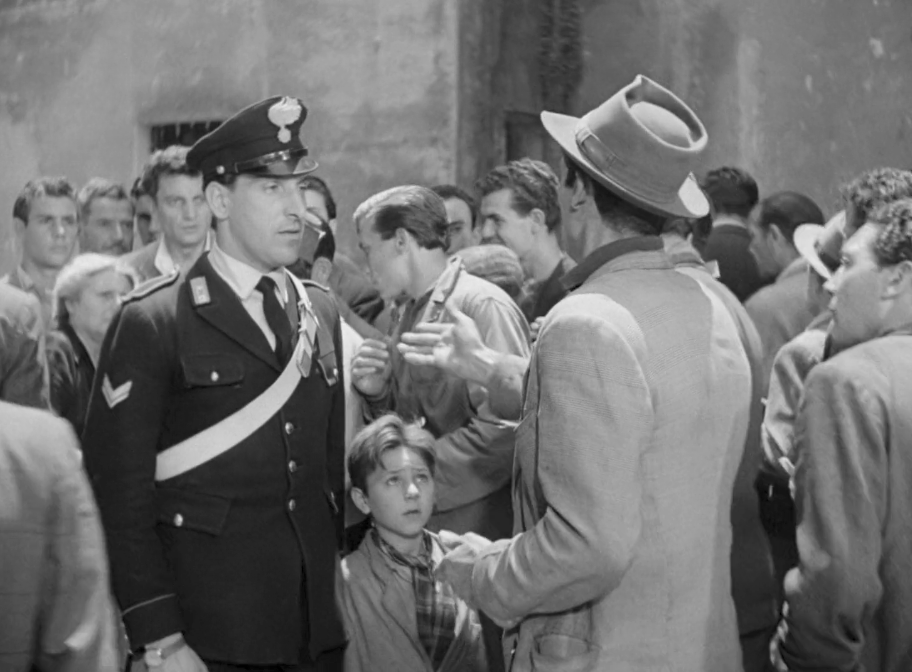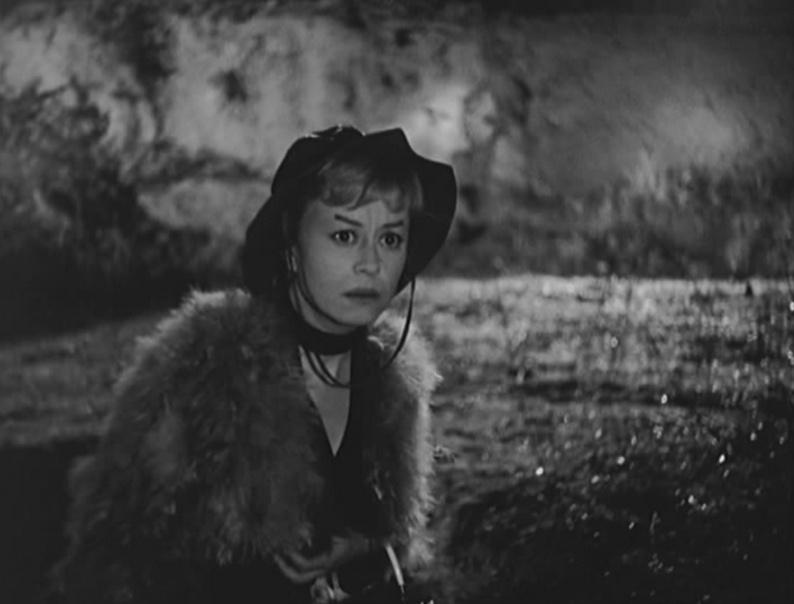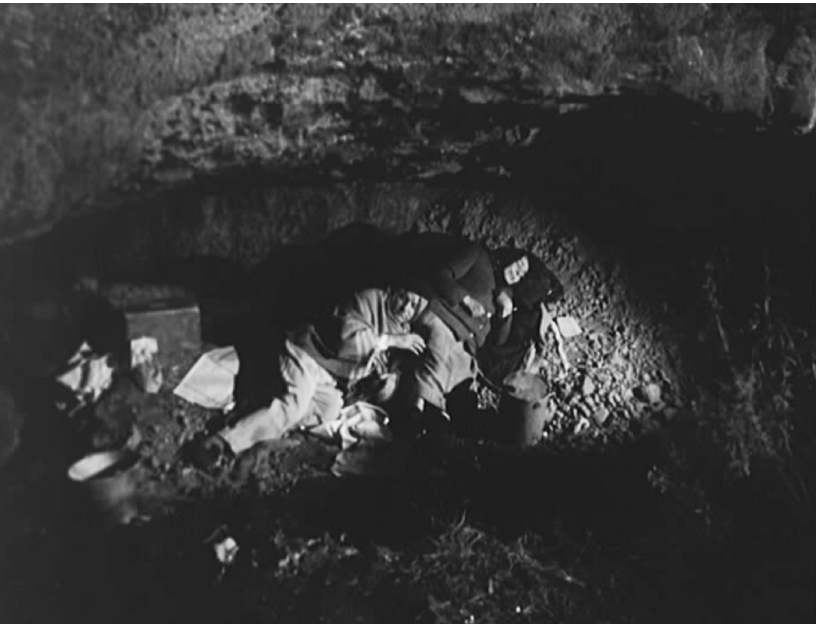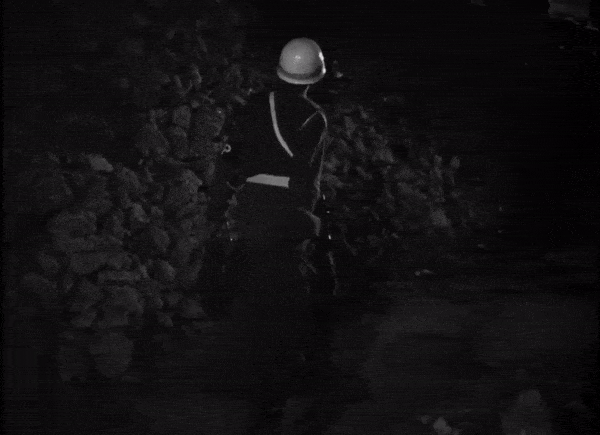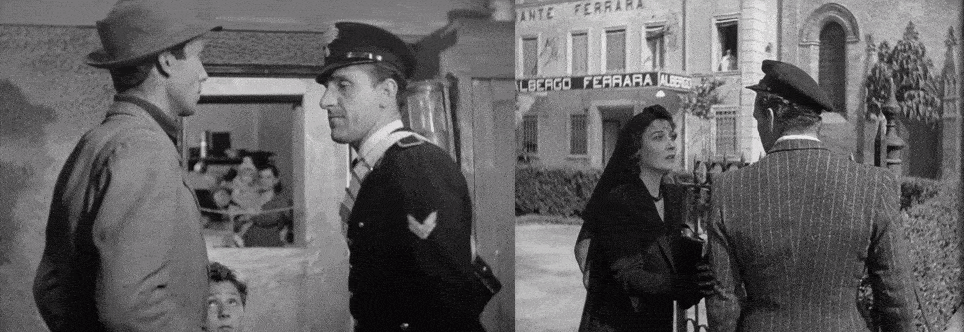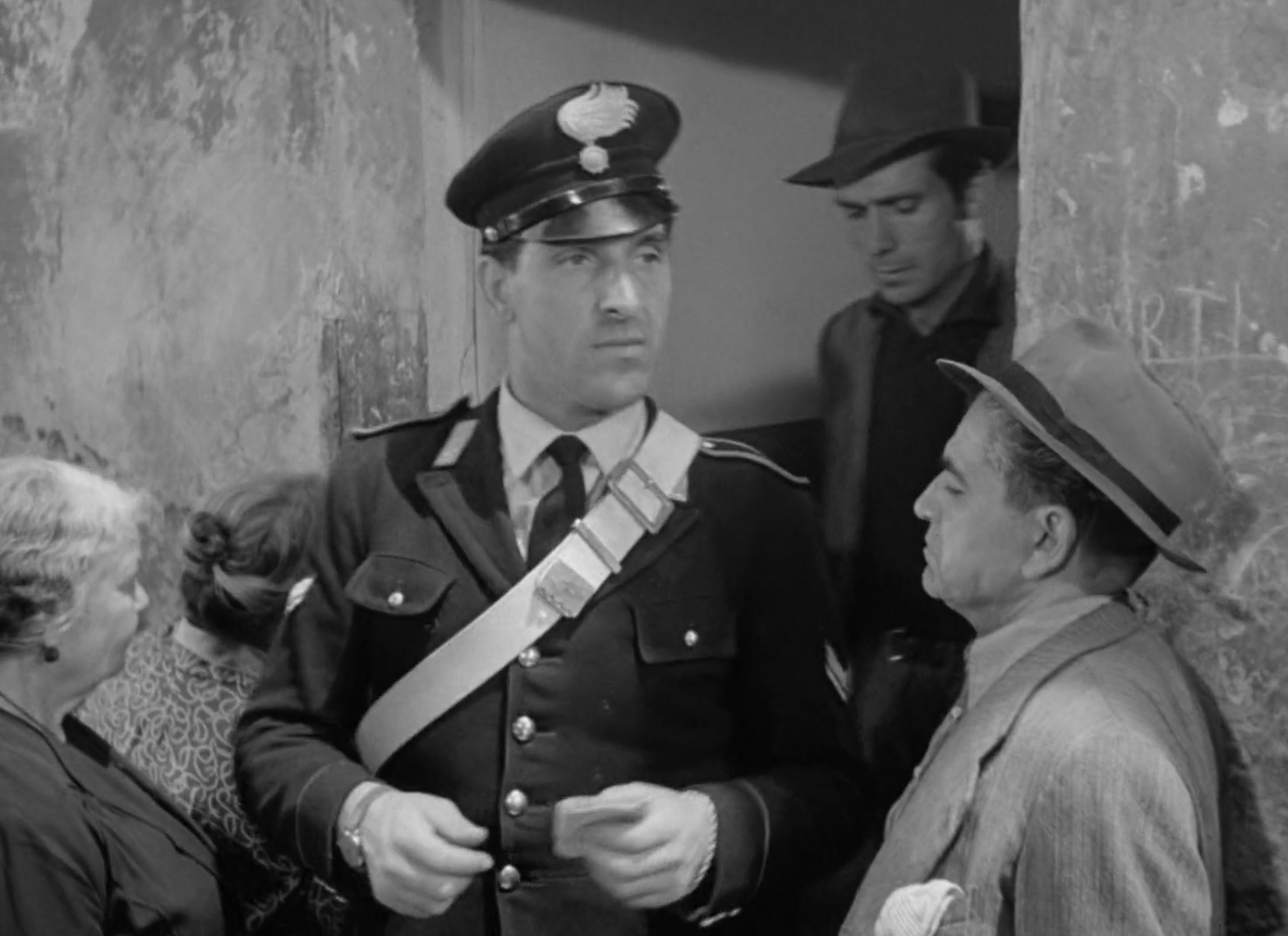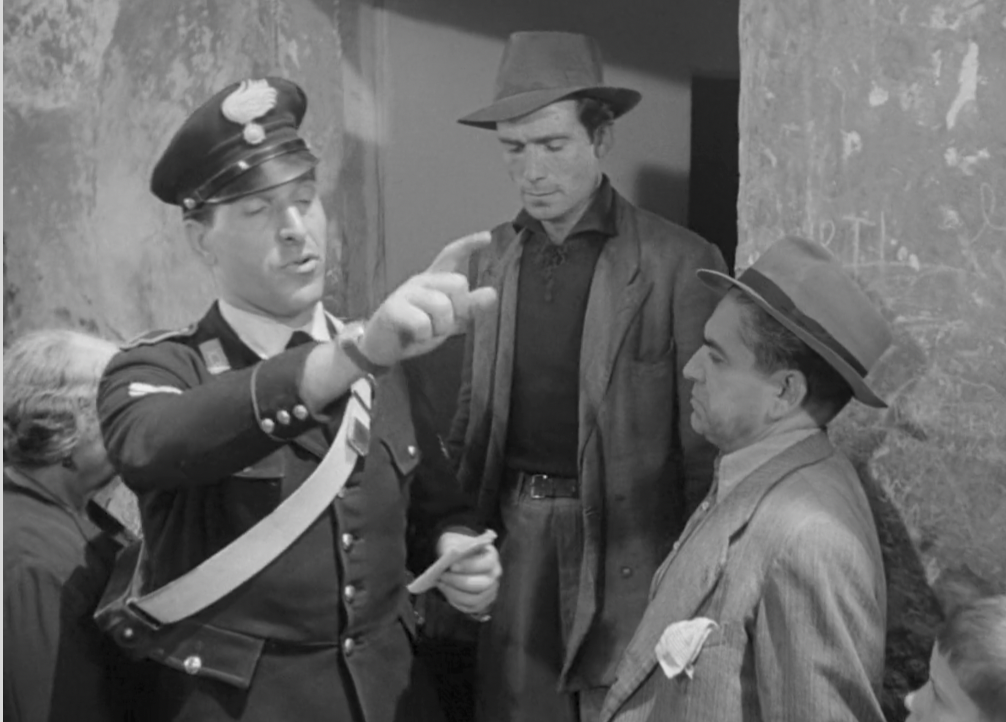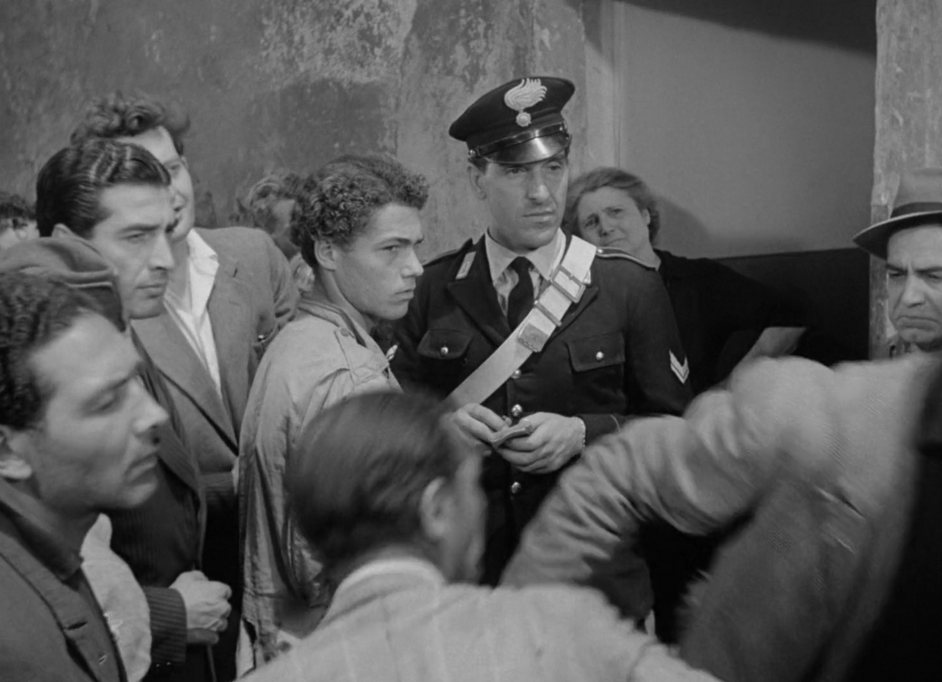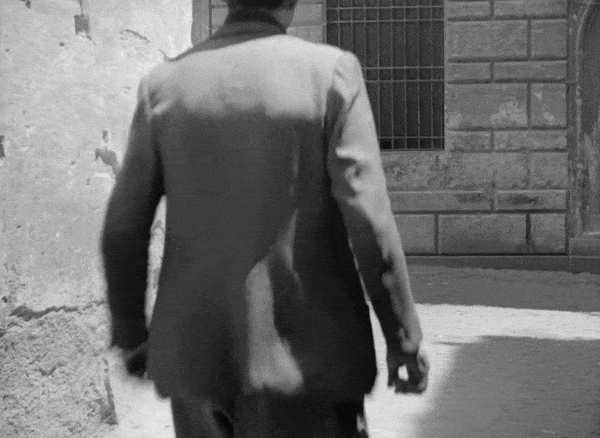Regia / Director: Vittorio De Sica, 1948
Gli uomini restano in piedi nel cortile, con le mani in tasca, a guardare. Dietro l'angolo arriva Bruno e, un passo dopo, un poliziotto in uniforme (Eolo Capritti).
The men stand in the courtyard, hands in pockets, watching. Around the corner comes Bruno and, a step behind, a uniformed policeman.
Antonio getta a terra il bastone e la folla si disperde.
Antonio throws down his stick, and the crowd scatters.
Il poliziotto guarda il ladro, svenuto tra le braccia della madre, con gli uomini del quartiere vicini. Chiede: "Dov'è quello della bicicletta?"
Antonio fa un gesto. "Eccolo lì, sta facendo la commedia".
The policeman glances at the thief, unconscious in his mother’s arms, with the neighborhood men close by. He asks, “Where’s this bicycle fellow?”
Antonio gestures. “There he is, putting on a show.”
"Quale commedia?" – protesta un astante– "Questo poveraccio sta più di là che di qua!"
Il poliziotto chiede al ladro: "Dove abiti?"
Il ladro si rianima e risponde: "Qua. Non ho niente da nascondere".
“What show?” a bystander protests. “This poor guy is half dead!”
The policeman asks the thief, “Where do you live?”
Reviving himself, the thief replies, “There. I have nothing to hide.”
Sua madre è fuori di sé. "Che hai da dire contro mio figlio? È incensurato! Tutti lo conoscono qua! Tutti possono testimoniarlo!" insiste, agitando un pugno.
"È vero! È vero!" dicono molte voci.
L'agente osserva impassibile la scena.
His mother is beside herself. “What do you have to say against my son? He’s got a clean record! Everyone knows him here! Everyone can testify to that!” she insists, waving a fist.
“It’s true! It’s true!” say many voices.
The officer observes the scene impassively.
"Dice che è perché ha il cappello tedesco!" aggiunge uno dei pezzi grossi ben vestiti del quartiere.
Mostrando il suo cappello, un altro uomo chiede: "E questo non è tedesco?"
La folla ride.
“He says it’s because he wears a German cap!” adds one of the well-dressed big shots of the neighborhood.
Displaying his hat, another man asks, “Isn’t this German, too?”
The crowd laughs.
Il poliziotto dice al ladro: "Andiamo, controlliamo la casa. Alzati!"
La madre si oppone: "Ma non si può muovere!"
The police officer says to the thief, “Let’s go, we’ll check the house. Get up!”
His mother objects: “But he can’t move!”
Il poliziotto dice alla madre: "Allora ci accompagni lei".
"Per carità... È casa di brava gente la nostra. Venite".
The policeman tells the mother, “Then you take us.”
“For heaven’s sake… It’s a house of honest people, our house. Come.”
Lei fa strada. Mentre entrano nell'edificio, un uomo in un abito sgualcito dice ad Antonio: "Io ti denuncerei per diffamazione".
Una donna anziana lo rimprovera: "Quel ragazzo non ha mai fatto male a una mosca!"
She leads the way. As they enter the building, a man in a rumpled suit tells Antonio, “I’d sue you for slander.”
An old woman scolds him: “That boy’s never hurt a fly!”
Entrano nell'appartamento. "Qui si fa presto a vedere", dice la madre. Agita la mano indignata verso Antonio. "La casa è tutta qua e ci stiamo in quattro".
They enter the apartment. “Here you can easily see,” says the mother. She shakes her hand indignantly at Antonio. “The whole house is right here and there are four of us.”
Attraversa la stanza. "Lui dorme qua". Solleva il materasso. "Guardate sotto il letto se ci sono le biciclette".
She walks across the room. “He sleeps here.” She lifts the mattress. “Look under the bed to see if there are any bicycles there.”
Scuote le dita serrate in un gesto di frustrazione.
She shakes her clenched fingers in a gesture of frustration.
Solleva il coperchio di una vecchia pentola sul fornello. "Invece di venire a offenderlo, date un posto a quel poveraccio. É tanto tempo che cerca un lavoro, anima benedetta".
She lifts a lid on an old pot on the stove. “Instead of insulting him, give the poor boy a job. He’s been looking for one for a long time, bless his soul.”
In questa scena, Antonio vede una famiglia ancora più povera della sua. Ma almeno questa famiglia ha un appartamento: nella Roma del dopoguerra, i più poveri tra i poveri vivevano alla periferia della città, nelle caverne, come Cabiria ha scoperto in Le notti di Cabiria (Federico Fellini, 1957).
In this scene, Antonio sees a family even poorer than his own. But at least this family has an apartment: in post-war Rome, the poorest of the poor lived on the outskirts of the city, in caves, as Cabiria learned in Nights of Cabiria (Federico Fellini, 1957).
In Paisà (Roberto Rossellini, 1946), un soldato americano, Joe, fa una scoperta simile e terrificante quando i suoi stivali vengono rubati da un orfano che fa del suo meglio per sopravvivere nelle strade della Napoli occupata dagli Alleati. Quando Joe lo trova più tardi, dice al ragazzo di mostrargli dove vive, per riavere i suoi stivali.*
*Per un approfondimento di questa scena, con audio, cliccare qui.
In Paisan (Roberto Rossellini, 1946), an American soldier, Joe, makes a similar horrifying discovery when his boots are stolen by an orphan, doing his best to survive on the streets of Allies-occupied Naples. When Joe spots him later, he tells the boy to show him where he lives, in order to get his boots back.*
*For a little more of this scene, with sound, click here.
Antonio e l'agente cercano la bicicletta. Anche Bruno aiuta.
Antonio and the officer look around for the bicycle. Bruno helps, too.
Il poliziotto fa un cenno ad Antonio e gli chiede, non senza compassione: "Senti un po’... hai nessuno che possa testimoniare a tuo favore?"
"Io posso testimoniare!"
The policeman beckons to Antonio and asks, not without compassion, “Listen, do you have anyone who could testify in your favor?”
“I can testify!”
"Vuole uscire un momento, signora?" chiede il poliziotto. La signora esce dalla stanza, borbottando con rabbia, e si chiude la porta alle spalle.
"Ti puoi essere sbagliato. Sei sicuro di averlo riconosciuto?"
"E come no? Sì che l’ho riconosciuto!"
“Do you want to step out for a moment, signora?” the officer asks. She leaves the room, muttering angrily, and closes the door behind her.
“You could be mistaken. Are you sure that you recognized him?”
“Of course, I recognized him!”
"Vieni qua". L'agente lo conduce alla finestra e si affacciano. "Guarda un po’. Vedi?"
“Come here.” The officer leads him to the window, and they lean out. “Take a look. See?”
Dall'alto, vediamo gli uomini del quartiere che mormorano riuniti attorno al ladro. Solo una manciata indossa un cappello. Si girano, quasi all'unisono, e guardano in alto, verso la finestra.
From above, we view the neighborhood men gathered around the thief, murmuring. Only a handful wear hats. They turn, almost as one, and look up to the window.
Il poliziotto dice ad Antonio: "Quelli sono tutti i testimoni a favore suo. Perdi tempo. Di queste storie ne vedo tutti i giorni". Tra i due uomini, Bruno alza lo sguardo, malinconicamente.
The police officer tells Antonio, “Those are all witnesses on his side. You’re wasting your time. I see stories like this every day.” Between the two men, Bruno looks up, wistfully.
Prendiamoci un momento per ammirare il lavoro di questi registi e dei loro direttori della fotografia, che inserivano dettagli incantevoli nelle loro inquadrature. A sinistra, una donna con un bambino in braccio guarda verso Antonio e il poliziotto, prima di chiudere la persiana. A destra, da Ossessione (1943), mentre i due amanti discutono, il regista Luchino Visconti inserisce una donna che si spazzola i capelli a una finestra.
Let’s take a moment to admire the work of these directors and their cinematographers, layering lovely detail into their shots. On the left, a woman holding a baby looks over at Antonio and the policeman, before closing a shutter. On the right, from Ossessione (1943), as the two lovers argue, director Luchino Visconti includes a woman brushing her hair at a window.
Il poliziotto apre la porta. La madre entra con uno sguardo di sfida, e i visitatori se ne vanno.
The officer opens the door. The mother comes in, with a defiant look, and the visitors depart.
Scendono lentamente una stretta scala.
Il poliziotto si ferma e si gira: "Forse hai ragione, ma ti manca la prova. E se per caso lui è innocente, sono pasticci. Questi o li cogli sul fatto o trovi la refurtiva. Sennò non c’è niente da fare".
They walk slowly down a narrow stairway.
The policeman stops and turns: “Maybe you’re right, but you have no proof. And if he happens to be innocent, you’re in trouble. These guys, you have to catch them in the act or find the loot. If not, there’s nothing to be done.”
"Io gli spacco la faccia!"
"E così finisci dentro te".
“I’ll smash his face in!”
“Then you’d end up in jail.”
Antonio si passa la mano sul viso. "Se sapesse che vuol dire per me questa storia".
Senza parole, il poliziotto si volta per andarsene.
Antonio passes his hand down his face. “If you only knew what this thing means to me.”
Wordlessly, the policeman turns to leave.
Tornato nel cortile, indica il ladro. "Vieni un po’ qua!"
Antonio rimane sulla soglia, con gli occhi chiusi, come se la scena fosse più di quanto possa sopportare.
Back in the courtyard, he points to the thief. “Come here for a second!”
Antonio stands in the doorway, eyes closed, as if the scene is more than he can bear.
Tenendo in mano il suo berretto tedesco, il ladro dice gentilmente: "Ora che sto bene, sono anche disposto a venire in questura".
Gesticolando verso Antonio, uno degli uomini eleganti chiede: "Sei contento? Che hai trovato? Niente!"
Holding his German cap in his hand, the thief says politely, “Now that I’m okay, I’m even willing to go to the police station.”
Gesturing toward Antonio, one of the well-dressed men asks, “Are you happy? What did you find? Nothing!”
Il poliziotto chiede se Antonio vuole fare denuncia. Ancora una volta, Bruno guarda in alto mentre si svolge l'azione.
Antonio guarda i volti degli uomini intorno a sé.
The officer asks if Antonio wants to press charges. Once again, Bruno is looking up as the action unfolds.
Antonio looks at the faces of the men around him.
Accettando la sconfitta, si volta per andarsene, senza dire una parola.
Accepting defeat, turns to leave, without saying a word.
Gli altri uomini lo deridono.
"Esatto. È meglio che te ne vada".
Provando ad allontanarsi dalla folla, Antonio spinge via gli uomini sul suo percorso e se ne va, mentre suo figlio cammina dietro di lui.
Lo prendono in giro: "Mandaci una cartolina!"
The other men jeer at him.
“That’s right. You’d better just leave.”
Trying to get away from the crowd, Antonio pushes the men out of his way and he leaves, his son walking behind him.
They taunt him: “Send us a postcard!”
All'angolo, Antonio si ferma e si gira. La macchina da presa zooma; dietro di lui, griglie di pietra e metallo lo incorniciano. Si è lasciato Bruno alle spalle, senza pensarci.
Al sicuro nel loro cortile, gli uomini alla fine smettono di urlare, soddisfatti.
At the corner, Antonio stops and turns. The camera zooms in; behind him, grids of stone and metal frame him. He’s left Bruno behind, without a thought.
Secure in their courtyard, the men stop yelling at last, satisfied.
FINE PARTE 22
Ecco Parte 23 of this cineracconto! Subscribe to receive a weekly email newsletter with links to all our new posts.






